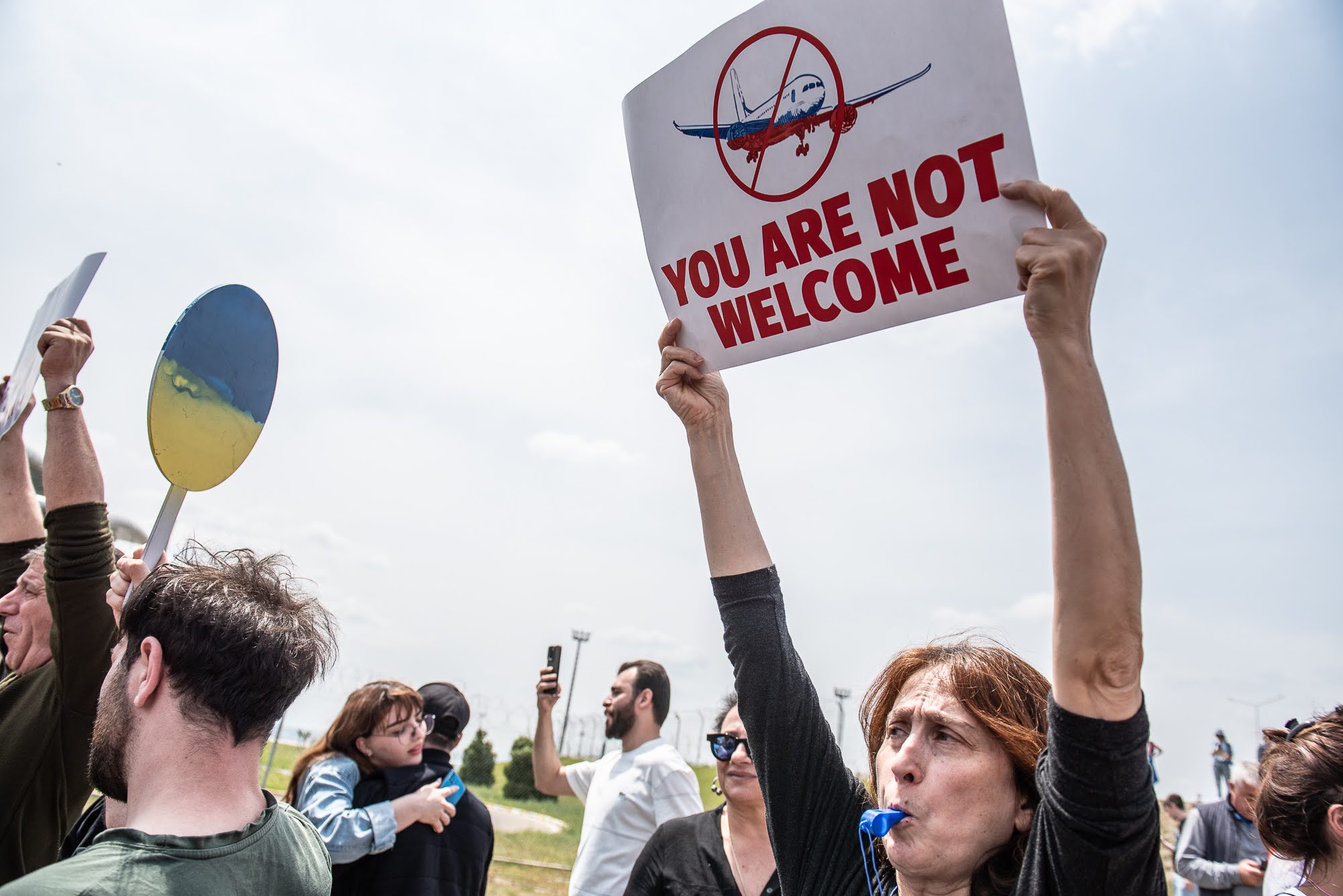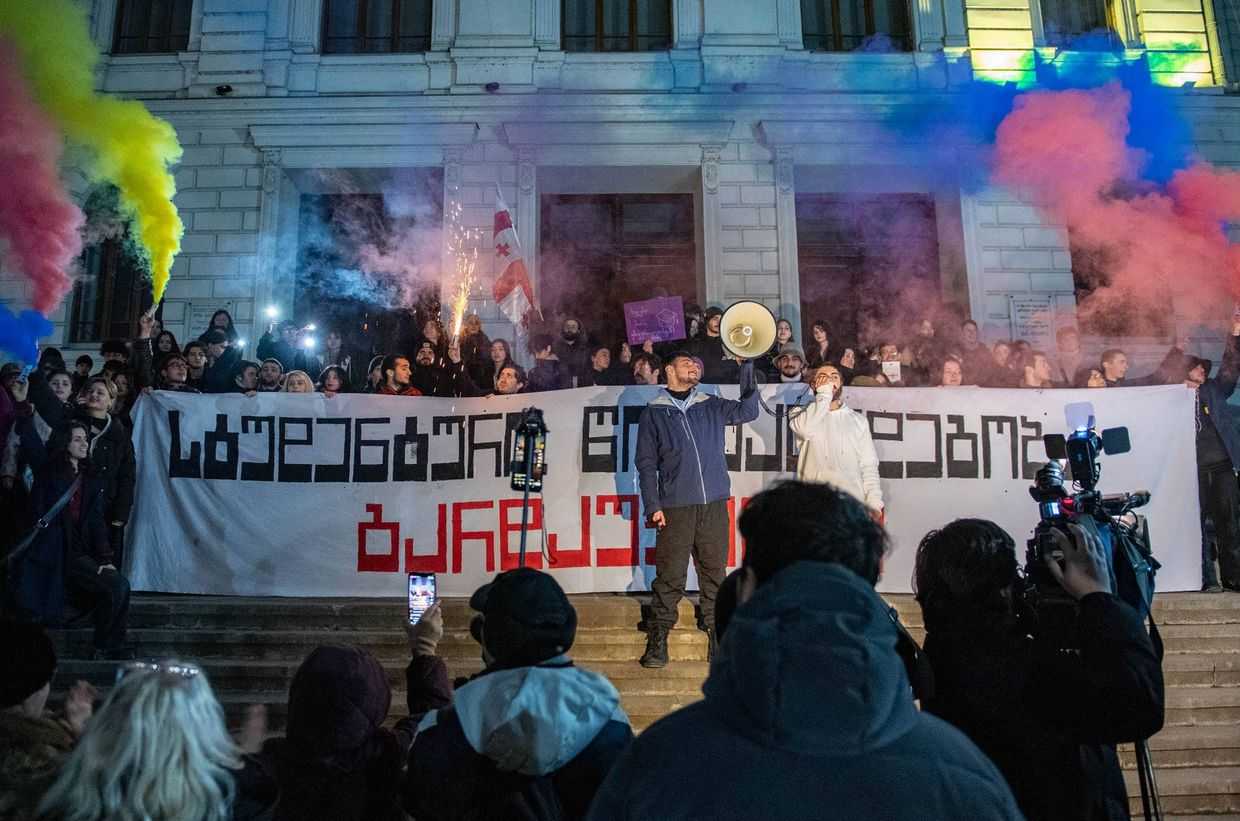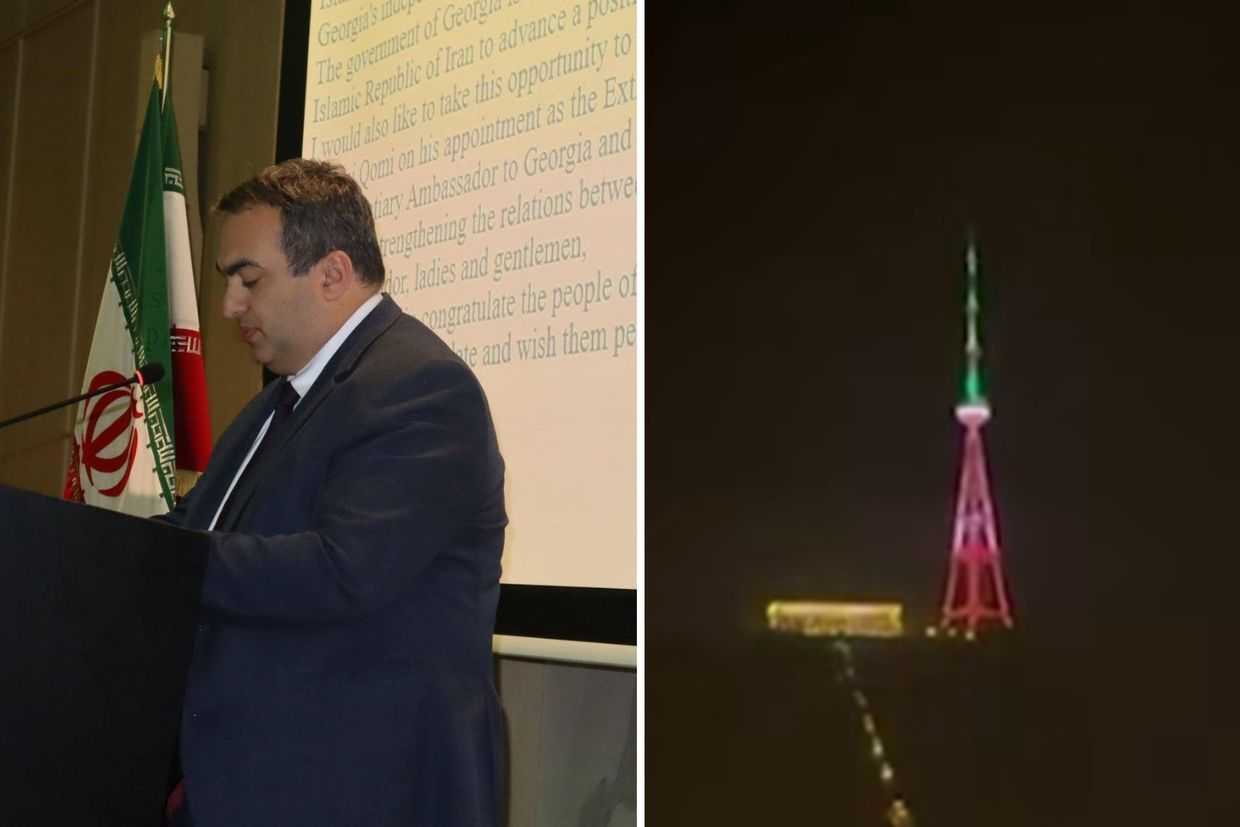
The American rock band, the Killers, has been whistled and booed at by fans in Georgia for bringing a Russian fan on stage from the audience to play the drums for them.
The band was performing at the Black Sea Arena festival in the Georgian town of Shekvetili, Adjara, on Tuesday.
During the show, vocalist Brandon Flowers invited the fan to perform on the drums, something the band regularly does, after noticing he held a banner in the crowd reading: ‘if destiny’s kind, I’ll be your drummer tonight’.
Flowers himself announced the fan was Russian and went on to ask the audience if it was OK for them if he played for the crowd, inadvertently politicising his presence onstage.
‘You know, we don’t know the etiquette of this land, but this guy is Russian. Are you OK with the Russian coming up here?’, Flowers asked the crowd.
He was met with whistles and shouts of ‘Russia is an occupier!’ and ‘Fuck Russia!’ Others gave the middle finger to the band. Others applauded as a sign of approval.
After the song, and while again receiving boos from the crowd, the vocalist tried to mitigate the anger by insisting that nationalities and borders should not divide and that his band’s shows ‘bring people together’, but to little avail.
‘Tonight, I want us to celebrate that we’re here together, and I don’t want it to turn ugly. I see you as my brothers and sisters’, Flowers told the crowd.
Some concertgoers walked out in protest and immediately took their disappointment to social media. Some among them also seemed frustrated with the organisers of the concert and other Georgian fans who continued to enjoy the show.
‘[Only] 1% of us left the concert in the middle of the show, the rest remained […] We’re fucked! […] Fuck Russia!’, one of the apparent concert-goers, going by the name Natali Danelia on Facebook, complained on Tuesday night.
The local alternative rock band Loudspeakers, who opened for the Killers on Tuesday, expressed anger later that night with what they described as an attempt from the headliners to ‘reconcile Russians and Georgians’.
‘You should know where you’re going! Russia is an enemy and an occupier!!!’, the band wrote on their Facebook page.
The Killers later apologised while insisting that their message was not political and did not refer to Georgian-Russian relations.
‘We recognise that a comment, meant to suggest that all of the Killers’ audience and fans are “brothers and sisters”, could be misconstrued. We did not mean to upset anyone and we apologise’, the band said in a statement.
A festival sponsored by the ‘pro-Russian government’
Following the show on 15 August in Adjara, the Black Sea Arena also apologised to concert-goers and said they ‘did not share’ Brandon Flower’s ‘posiiton’.
‘We recognise our share of responsibility and sincerely apologise […] Russia is an occupier’, the organisers underlined.
But for a number of Georgians, the Black Sea Festival had political implications from the onset.
Last November, the government vowed to spend ₾70 million ($27 million) on financing performances of ‘world-renown musical bands and performers’ in Georgia for 2023–2024.
In April, the Georgian Government, headed by Prime Minister Irakli Gharibashvili, promised a series of high-profile concerts from artists like Bruno Mars, the Killers, and Imagine Dragons. Marketed as the Starring Georgia project, the government said the aim was to ‘popularise the country’ and ‘strengthen its touristic, economic, and cultural potential’.
Imagine Dragons, possibly the most anticipated of these among young Georgians, are slated to play in Tbilisi later in August.
The announcement of this year’s lineup came weeks after massive protests against a planned foreign agent law, dubbed the ‘Russian law’, that was strongly represented by young protesters.
[Read more on OC Media: Datablog | Is Georgia’s Gen Z more politically engaged than young millennials?]
Some government critics have suggested the concerts were the government’s attempt to win back the hearts of young people, especially after the ruling party tried to demonise politically engaged youth activists and the authorities criminally charged one of the protesters, 21-year-old Lazare Grigoriadis, for arson and violence.
Black Sea Arena, the firm in charge of the two-year Starring Georgia campaign, was previously owned by Limestone Finance International, an offshore-registered company reportedly belonging to the Georgian billionaire and Georgian Dream founder Bidzina Ivanishvili. Local and international critics widely regard Ivanishvili as the ‘informal ruler’ of Georgia through his former company affiliates, including the current PM Irakli Gharibashvili.
In 2016, the Ivanishvili-owned Kartu Foundation finalised the construction of the 10,000-strong concert hall and donated Black Sea Arena to the state. According to Squander Detector, a local anti-corruption watchdog, throughout 2017–2020, the Black Sea Arena received at least ₾33 million ($13 million) in subsidies from the state.
Why Georgians are anxious about Russians
Georgians overwhelmingly see Russia as ‘occupiers’ of Abkhazia and South Ossetia, two regions that broke away from Georgia in the early 1990s, and as a main threat to their security, especially after Russia invaded Georgia in the 2008 August War.
Fears of a Russian military threat or Russia’s political and economic influence on Georgia rose after Russia’s full-scale invasion of Ukraine.
The war against Ukraine and the military draft announced by the Kremlin triggered a mass inflow of Russian citizens into Georgia, including political emigres. These led to calls from some pro-Western opposition groups in Georgia for visas to be introduced for Russians, something the Georgian government has rejected.
In a survey commissioned by the Washington-based International Republican Institute (IRI) in March, 37% of those polled agreed with the statement that ‘Russian citizens should not be allowed in Georgia until they return our occupied territories’ while only 4% said that they were ‘very much welcome in Georgia’.
Several weeks before The Killers experienced backlash against what they suggested was their ‘misconstrued’ message in Adjara, the autonomous region’s capital, Batumi, saw protests against a cruise liner from Russia.

In May, many Georgians also condemned the Georgian government’s decision to restore direct air flights with Russia after the Kremlin’s decision to lift unilateral travel restrictions with Georgia.
Protesters saw it as another sign of Georgian-Russian rapprochement.
[Read more on OC Media: Russia’s top diplomat compliments Georgia for not ‘irritating’ them]
The ruling Georgian Dream party, facing accusations of running a ‘pro-Russian’ government and undermining Georgia’s pro-Western aspirations, have repeatedly characterised anti-Russian sentiments among Georgians as a ‘xenophobic’ voice of a ‘radical’ minority.






![Baia Margishvili standing in central Tbilisi with a sign reading: ‘The Prosecutor’s Office [is] a punitive squad. How many more innocent people will you put in prison?’ Photo: Mariam Nikuradze/OC Media.](/_next/image/?url=https%3A%2F%2Fassets.bucket.fourthestate.app%2Foc-media-prod%2Fcontent%2Fimages%2F2026%2F02%2Fcalls-for-sanctions-and-raids-19-10-25-48.jpg&w=3840&q=50)


